|
San Francisco became the first city in the country to honor the Queer and Trans API (QTAPI) community with a designated week of celebration and recognition on Tuesday when the San Francisco Board of Supervisors unanimously passed a resolution by District 8 Supervisor Rafael Mandelman to declare the week of May 22nd through May 29th, 2021 as Queer and Transgender Asian and Pacific Islanders week in San Francisco.
“QTAPI San Franciscans have been shattering glass ceilings and bettering our city for a long time,” said Mandelman who is the only LGBTQ+ member of the Board of Supervisors and represents the Castro District. “Amid a spate of heinous anti-AAPI attacks in San Francisco and around the United States, and with state legislatures across the country targeting the LGBTQ+ community, this will send a strong message of support and solidarity to QTAPI people everywhere. Thank you to the Bay Area QTAPI Coalition for all of their work to create the first ever QTAPI Week here in San Francisco.” The Bay Area QTAPI Coalition formed in 2017, when Miss GAPA 2016 Juicy Liu saw a need to celebrate Queer identity and bring visibility to QTAPI’s during one of the most important times of the year in many Asian cultures, the Lunar New Year. The Coalition’s first event, Enter the Rooster, was held at Strut in the Castro to celebrate 2017’s Year of the Rooster and was followed up in 2018 with New Year, New Tricks at Oasis, When Pigs Fly Over The Moon at Salesforce Tower in 2019, Leaping Rats, Hidden Histories at Origin Night Club in 2020, and Ox Talks on Zoom in 2021. This working coalition of many QTAPI organizers and community organizations recognizes their interdependence, collective strength, and power in unity. In response to the murder of six Asian women in three massage parlors in Atlanta on March 16, 2021, the Bay Area QTAPI coalition mobilized thousands of people for two direct actions – Castro to Chinatown: an LGBTQ+ Solidarity March and Rally Against AAPI hate. The Bay Area QTAPI Coalition conceived of QTAPI Week to celebrate their diversity and strength as a coalition, individually organizing supportive spaces that are not luxury items, but essential spaces for survival. QTAPIs expand these spaces from virtual to in person, and through the formal recognition of QTAPI Week, the coalition celebrates its power. “Growing up in Plano, Texas, I rarely saw anyone Queer or Trans and Asian or Pacific Islander (QTAPI),” said Michael Nguyen, lead Organizer of QTAPI Week, Chair of GLBTQ+ Asian Pacific Alliance (GAPA) and Co-Founder of the Bay Area QTAPI Coalition. “I am hopeful that QTAPI Week inspires all those in our community, especially our family and allies, to live their most authentic selves and see our collective strength and resilience in these turbulent times. Like Harvey Milk once said, you gotta give ‘em hope.” "As a South Asian woman of trans experience, I have often had to navigate out of my cultural identity to ascertain my gender identity,” said Anjali Rimi, President of Parivar and Co-Founder of the Bay Area QTAPI Coalition. “I am grateful for the visibility for QTAPI folx in the city of San Francisco and to be able to bring my whole self to this world.” “As May is a month for Asian and Pacific Islander Heritage and June is a month for Pride, both also represent the necessity to recognize that our struggles and liberation are inextricably connected,” said Nick Large, one of the founding partners of the Bay Area QTAPI Coalition. “Our QTAPI week is a proclamation not only that we will take up space, but also that we will not allow ourselves to be under voiced and have our diverse community ignored as a monolith. A racist model minority narrative dictates that we are all worker bees, void of individuality and material differences. It hides that Pacific Islanders in our community experience the highest rates of homelessness in the country, that refugees with no connection to their government listed country of origin are being deported, and that Chinatown has one of the highest rates of poverty in the city, in addition to a strong documented history of queer nightlife and refuge. Instead of shrinking ourselves, we choose in this moment to expand ourselves.” The resolution details the rich history of San Francisco QTAPI community leaders like Margaret Chung, the first American surgeon of Chinese descent who wore “mannish attire” and had several romantic relationships with women, and Vince Crisostomo, a gay Chamorro HIV-activist who became the first publicly out HIV-positive Pacific Islander at World AIDS Day in 1991. It also shares the history of important organizations that were formed by and for the QTAPI community like the Gay Asian Support Group, Asian American Feminists, and the Gay Asian Pacific Alliance, now the GLBTQ+ Asian Pacific Alliance (GAPA), to create QTAPI connectivity, power and access to essential services like health care. “Thank you to the city for making public the value of queer and trans Asians and Pacific Islanders,” said Dr. Amy Sueyoshi, Dean of the College of Ethnic Studies and Professor of Race and Resistance Studies and Sexuality Studies at San Francisco State University. “Let us devote at least one week to explicitly declaring to queer and trans API folks that they are seen and loved. As we celebrate this recognition however, it is simultaneously a charge for us to continue to better serve queer and trans BIPOC across San Francisco if not the larger Bay Area. In a racialized economy that privileges heterosexuality, queer and trans BIPOC in particular face economic insecurity, even for those in the middle class.” The Bay Area QTAPI Coalition and Supervisor Rafael Mandelman will kick-off QTAPI Week this Saturday, May 22nd, with a press conference at 11am in Jane Warner Plaza in the Castro District. Community chats will be held that weekend online, focusing on combating anti-AAPI hate crimes and the power of allyship with communities of color on May 22nd as well as API Equality Northern California’s (APIENC) launch of the Queer Asian and Pacific Islanders Cis Allies Project (QAPICAP) on May 23rd, an intergenerational project to unlearn and end transphobia within our LGBTQ+ Asian and Pacific Islander community. During the week, the community and allies are invited to the GAPA Membership meeting on Monday, May 24th from 7:30pm-9pm, focusing on GAPA’s actions in the face of anti-AAPI hate and preparing for GAPA Runway, the annual pageant extravaganza showcasing QTAPI talent and identity. The Asian American Bar Association of the Greater Bay Area (AABA) LGBTQ Committee will present a conversation with community activists online on May 26th from 6pm-7:30pm where Drag Activist Juicy Liu will sit down with Harvard Professor and LGBTQ+ legal scholar, Alexander Chen. Additional support groups and online meetings will hold space for our Queer and Transgender Asian and Pacific Islander communities, sponsored by the San Francisco Community Health Center. The closing celebration of QTAPI Week will happen on Saturday, May 29th, with a solidarity dance party in the parking lot on 18th Street and Collingwood in the Castro District from 11am to 4pm. Headlined by reigning Miss GAPA, Mocha Fapalatte, with appearances by Miss GAPA 2000 Chi Chi La Woo and Miss GAPA 2017 Ehra Amaya, emcees Estée Longah & Kristi Yummykochi of the Rice Rockettes, San Francisco’s only all-API drag troupe, and DJs Confetti Canon and Chico Chi will help unite our intersectional AAPI and LGBTQ+ communities in solidarity and celebration to bring much QTAPI light and love and show the world the power and resilience of QTAPI community.
0 Comments
In the land of minority stories being told by those who don’t know the struggle, “Pose” smashed the narrative. The show made history by not only creating storylines that truly expressed the lives of the LGBTQ community, but by creating a diverse cast, including the largest transgender cast to appear on television. As the series prepares for its third and final season, the creators, cast and crew, during a press conference, reflected on the filming of the final season and the overall experience of taking part in something that has changed so many lives. We had the opportunity to ask the cast if they were encouraged to offer input in development of their character or storyline. 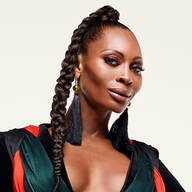 DOMINIQUE JACKSON, “Elektra” Immigrant, Black, woman, trans. Never been on set, right? Other sets, but not sets that celebrated me or validated me or acknowledged me. And to walk on to that set of "Pose" and to hear Mr. Murphy go -- say, "Is that how it's done?" that was -- it was validation in itself. When Steven says, "Listen, I've been a part of this" -- and it was so amazing to sit back, because as I am ballroom and as I get to sit back and watch as everything happens around me, I see the passion, the compassion, the care, the want to know that it's being done right. When you have directors like Steven and Janet, and even though Janet is one of us and is us, the beauty of her saying, the validation of her saying, "Listen, is this right?" when Steven says, “I don't know about this," the consultants that were brought in -- Twiggy, Leiomy, all of them -- this was not a place, for me personally, where I felt -- and being a part of ballroom, being ballroom, I didn't have to say anything. Only when we had that last scene with the -- going into the 42nd Street and Elektra coming back into show world, that was the only time I had to walk on set and really say, "No. We were not sleazy. We were not degenerate. We were not" -- "we were fetishes that were loved, and we brought the best even in the worst of times." So, all of it, it was amazing. So, to have all of that, yeah. 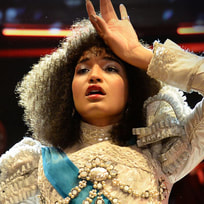 INDYA MOORE, “Angel” Steven and Janet Mock particularly, as a Black trans woman in the writers' room, it was perfect. I think that there were so many different parts of this story we're all telling and using our own lives to make a reality, details from our own experiences and lives. And I think that Janet did that brilliantly and beautifully, and Steven did that brilliantly and beautifully. And we were all able to relate and see ourselves in the lives of these characters so respectfully because of the way that the writers' room was organized so intentionally and the people who sat in it and, you know, who had the focus and centering on our characters. Their lives and the parts of their experiences that they used came so closely and reflective to ours and is just a true reflection of what the experience is to be trans or queer, that I can't remember a time where I ever felt like I needed to say, "Hey, this doesn't feel right." And Janet and Steven frequently came to us and checked in with us about the content and made sure that things felt right and were congruent and felt natural for us. But I think that that dynamic of the writers' room and the producers checking in with the actors to make sure that the story is being told right, that wasn't even a thing that needed to happen on this set. I think that that is something that's really important. When you have trans and queer characters on a show and you want to tell the story truthfully and you don't have writers who are a reflection -- who aren’t reflections of those experiences can be really difficult to nail right. So I would hope that in those circumstances, in the case where we don't have people who reflect us in a writers' room and who are the creators of our show, that they would check in on us, check in with us to make sure that they're telling the stories right and that they don't believe they can get it all right in their own minds, because they don't have the experience to come up with the imagination to tell that story. So, I think that the way that Steven and Janet put the story together was brilliant. And I think that that is the mechanism of the writers checking in and asking the actors, that is something that feels so necessary for productions where the writers and the creators aren't trans or queer. Like, that level of cross-talk. But here we're all together. We're all reflections of each other, creating. So, we don't navigate -- we're not navigating those same challenges. We're not navigating those challenges in that kind of way on our set in getting our story told truthfully. 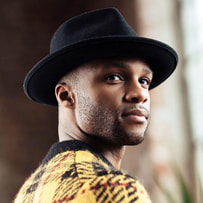 DYLLÓN BURNSIDE, “Ricky” I distinctly remember on my first day of filming not having, like, an idea about who Ricky was, where he came from, and what was, sort of, the idea around who he would become on the show. And I asked Steven those questions. Like, who do you think he is? Is there any insight you can give me as to how to play him? And Steven looked at me point-blank and said, who do you think he is? Where do you think he comes from? Where do you think he should go? And that kind of collaboration and open line of communication was there from day one and has existed throughout filming all three seasons. And I think that -- that instance speaks directly to what Indya's talking about. It's like this -- this -- we were a reflection of each other, and we allowed each other to speak to each other in a way that breathed life into these characters authentically.  HAILIE SAHAR, “Lulu” Steven and I first season had a conversation. I would meet him during lunch break and say, "Hey, Steven. Can I talk to you?" And I would say, “You know, Lulu has obtained all this information. She's second in command to Elektra, ambitious and intellectual. I don't think she would just want to be in this house forever.” And that's when that conversation happened. And I guess they went into the writers' room and something came out of that, because then Ferocity was also born. But I remember speaking to Steven and him allowing me to have that space to tell him how I felt about Lulu. And then, Janet, the brilliant, iconic Janet being of trans experience and a woman of color just effortlessly creating these characters and really, truly being authentic was just the icing on the cake. And that was my experience. 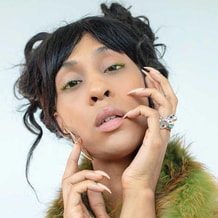 MJ RODRIGUEZ, “Blanca” So, I had been a part of the industry at a very young age, and what came with that was me feeling like I had to be limited in what I had to say and how I had to speak or if I had even opportunity to speak up. So, I was always this closed-off person. But with being involved in the industry, there was, I guess, this grooming that came with me. And I was naturally just afraid to ask questions. I was just the person, the girl to show up and just do the job. And I guess that most actors and actresses -- I'm sure I can say for all of my friends here that we usually do that. But I never had an opportunity like this on a television and film -- a television show where I got to actually have the range that I never thought I could have in the other productions or the other things that I was involved in. I think that's what the best thing for me was, is that I was able to have the liberty to speak even when I was afraid to speak. I had the liberty to delve into the character like how I wanted to and not be questioned, but still have small notes here and there. "Well, how about you speak it here, MJ?" Or, "How about you do this?" Or, "No, this is how it needs to be done." And sometimes that's what you need in order for you to fulfill the journey of the character that you're creating or the process that you want to put into the character. And I never had the -- the outspokenness. I never was able to speak up like how I was able to speak up in this show. And it's taught me a lot from first season until third season. I feel like not only did Blanca have an evolution, but I, Michaela, Mj Rodriguez had as evolution too. She's learned a lot. I mean, she's always been able to learn, but with these two, and also with Ryan Murphy, there was a great space to just quickly learn and really appreciate it while being able to be free in what you do naturally, which is the craft. So, I thank them tremendously for opening that space for me. Because now, moving forward, I feel like I'll be able to do that in any other project I go into. So, I thank for them that, and I think that's -- for me specifically, that's what opened me up in feeling like this is the place I feel comfortable in. This is what I want more of and I hope to go into more. Look for the full article coverage in PRIDE & Equality magazine this June and a review of season three in New Mexico Entertainment Magazine. The final season of Pose begins on May 2nd on FX.
|
P&E - After PrintHere are some of the latest articles and topics in the GLBT community. Archives
June 2024
Categories |

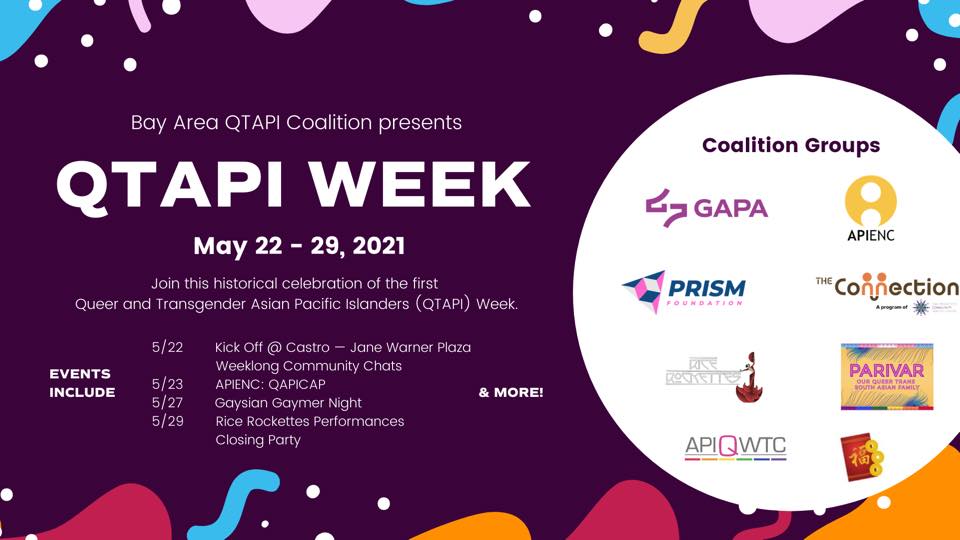

 RSS Feed
RSS Feed
